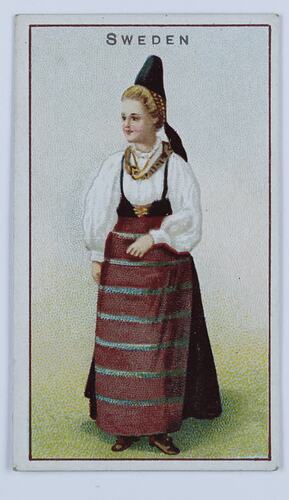Summary
Card illustrating a colour image of a left-facing woman wearing a costume from Sweden. It is one of a collection of 49 cards which depict women in a range of national and regional dress, with a particular focus on Northern European regional ethnicity. They date to the early 20th century.
The images on this set of cards are identical to those produced by Maynards Candy Co, a British Confectionary Company in their 'Girls of All Nations' series dated to the early 1920s. The Maynard set contains 50 cards, which are inscribed on the reverse with the text: 'Be sure you ask for Maynards Nougat Montélimart, a high-class French Nougat'. The museum's collection contains 49 cards (without the 'Grodner Girl' image) and has no inscription on the reverse.
The cards are similar in size, colour shade and typeface to cigarette cards printed in early 20th century Britain by cigarette companies such as Wills and Warwick and Warwick. Cigarette cards began production in America in 1885, when the 'stiffeners', pieces of card used to stiffen the back of cigarette packs, were printed with company advertising. Two years later, printed cigarette cards began circulation in Europe, and from the 1902 Wills 'Kings & Queens' set, routinely featured descriptions of the image printed on its reverse. This collection of cards has no company name or printing on the reverse side, suggesting that the cards are either anomalous or early examples, or might even have been produced specifically for collecting rather than distributed in cigarette packets.
Cigarette and other cards were often collected in paper photo albums, in which the cards were affixed beside descriptions. Trade Cards, such as those produced for the 1893 World Columbian Exposition by the Singer Manufacturing Company, also often featured national costume studies within Europe and areas of European colonial power. However, trade and candy cards were usually printed with the company name and description of the image on the reverse. Furthermore, books featuring images of local dress from the ethnic groupings of Germany, called 'Deutsche Volkstrachten', are similar in subject matter and style to this collection and have clean backs as they are designed to be collected in albums.
Physical Description
Small rectangular card. Printed in colour on front with a female figure in traditional national dress of the Swedish region. Figure is left-facing. No inscription on back.
Significance
This collection of cards provides a means of representing identity, cultural stereotyping and depictions of race and ethnicity. The cards complement the Museum's existing collections of national dolls; produced in the early 1900s (significantly earlier than most of the national dolls in the collection), they allow changes and continuity in the representation of these nationalities and ethnicities to be seen. From the perspective of gender, it is significant that these cards depict women as representatives of national distinctiveness, providing further examples for displaying the intersection of gender and ethnicity.
More Information
-
Collecting Areas
Migration & Cultural Diversity, Leisure, Clothing & Textiles
-
Acquisition Information
Purchase
-
Date Manufactured
-
Manufacturer (Possible)
-
Inscriptions
Front: 'Sweden'.
-
Classification
-
Category
-
Discipline
-
Type of item
-
Overall Dimensions
37 mm (Width), 63 mm (Height)
-
References
Evans, I. O. (1937/2008). Cigarette Cards and How to Collect Them. Obscure Press. Singer Manufacturing Company. (1892). Costumes of all Nations. [New York]. 36 Trade Cards, lithograph, 14x8cm, [Link 1] Professional Sports Authenticator Card Registry. (2012). 1924 Maynards Ltd. Girls of All Nations. Mims Collection, [Link 2] Deutsche Volkstrachten. (n.d. c. 1931). Eine Sammlung Deutscher Trachtenbilder. Cologne: Verlag Haus Neuerburg. [Link 3]
-
Keywords
National Costumes, Cards, Collectors, Cigarettes, Leisure Activities, Ethnic Groups
